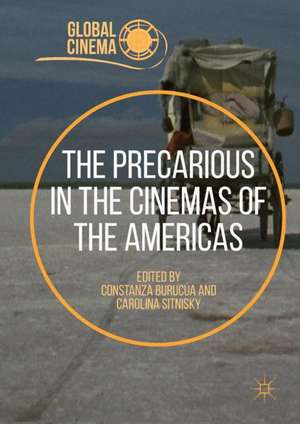The Precarious in the Cinemas of the Americas: Global Cinema
Editat de Constanza Burucúa, Carolina Sitniskyen Limba Engleză Hardback – 14 iun 2018
Toate formatele și edițiile
| Toate formatele și edițiile | Preț | Express |
|---|---|---|
| Paperback (1) | 526.50 lei 6-8 săpt. | |
| Springer International Publishing – 26 ian 2019 | 526.50 lei 6-8 săpt. | |
| Hardback (1) | 706.30 lei 6-8 săpt. | |
| Springer International Publishing – 14 iun 2018 | 706.30 lei 6-8 săpt. |
Din seria Global Cinema
- 9%
 Preț: 767.63 lei
Preț: 767.63 lei - 20%
 Preț: 566.90 lei
Preț: 566.90 lei -
 Preț: 386.81 lei
Preț: 386.81 lei - 15%
 Preț: 643.34 lei
Preț: 643.34 lei - 18%
 Preț: 783.68 lei
Preț: 783.68 lei - 15%
 Preț: 580.82 lei
Preț: 580.82 lei - 15%
 Preț: 699.12 lei
Preț: 699.12 lei -
 Preț: 392.37 lei
Preț: 392.37 lei -
 Preț: 385.84 lei
Preț: 385.84 lei - 15%
 Preț: 644.18 lei
Preț: 644.18 lei - 15%
 Preț: 592.44 lei
Preț: 592.44 lei - 15%
 Preț: 709.77 lei
Preț: 709.77 lei - 18%
 Preț: 790.46 lei
Preț: 790.46 lei - 18%
 Preț: 782.72 lei
Preț: 782.72 lei - 18%
 Preț: 732.21 lei
Preț: 732.21 lei -
 Preț: 386.81 lei
Preț: 386.81 lei - 15%
 Preț: 582.80 lei
Preț: 582.80 lei - 18%
 Preț: 781.15 lei
Preț: 781.15 lei - 15%
 Preț: 640.06 lei
Preț: 640.06 lei - 15%
 Preț: 698.15 lei
Preț: 698.15 lei - 18%
 Preț: 735.07 lei
Preț: 735.07 lei
Preț: 706.30 lei
Preț vechi: 830.95 lei
-15% Nou
Puncte Express: 1059
Preț estimativ în valută:
135.19€ • 146.90$ • 113.64£
135.19€ • 146.90$ • 113.64£
Carte tipărită la comandă
Livrare economică 21 aprilie-05 mai
Preluare comenzi: 021 569.72.76
Specificații
ISBN-13: 9783319768069
ISBN-10: 3319768069
Pagini: 327
Ilustrații: XXII, 301 p. 22 illus., 21 illus. in color.
Dimensiuni: 148 x 210 mm
Greutate: 0.68 kg
Ediția:1st ed. 2018
Editura: Springer International Publishing
Colecția Palgrave Macmillan
Seria Global Cinema
Locul publicării:Cham, Switzerland
ISBN-10: 3319768069
Pagini: 327
Ilustrații: XXII, 301 p. 22 illus., 21 illus. in color.
Dimensiuni: 148 x 210 mm
Greutate: 0.68 kg
Ediția:1st ed. 2018
Editura: Springer International Publishing
Colecția Palgrave Macmillan
Seria Global Cinema
Locul publicării:Cham, Switzerland
Cuprins
1. Introduction: Forms of the Precarious in the Cinemas of the Americas (Constanza Burucúa and Carolina Sitnisky).- 2. Beyond Documentary?: Archives, Absences, and Rethinking Mexican “Nonfiction” Film, c.1935-1955 (David M. J. Wood).- 3. Precarious Images: Media and Historicity in Pablo Larraín’s No (James Cisneros).- 4. The Future’s Reverse: Dystopia and Precarity in Adirley Queirós’s Cinema (Cláudia Mesquita).- 5. The Never-Ending Movie: Precariousness and Self-Reflexivity in Contemporary Argentine Cinema (Beatriz Urraca).- 6. Narrating Precariousness in Cuba beyond Havana and the ICAIC: The Case of Televisión Serrana’s Ariagna Fajardo and ¿A dónde vamos? (Michelle Leigh Farrell).- 7. Precariousness in Contemporary Venezuelan Filmmaking: Pelo malo and Brecha en el silencio (María Mercedes Vázquez Vázquez).- 8. The Politics of Precariousness and Resiliencein Contemporary Colombian Films (María Helena Rueda).- 9. Portfolio Careers and a New Common Cause: the Conditions for Screen Workers in Peru (Sarah Barrow).- 10. Rethinking Contemporary Ecuadorian Cinema (Carolina Sitnisky).- 11. Bolivian Indigenous Film and the Aesthetics of the Precarious (Gabriela Zamorano Villarreal).- 12. Indigenous Canadian Cinemas: Negotiating the Precarious (Christopher Gittings).- 13. Showcasing the Precarious: Paraguayan Images in the Film Festival Circuit (Constanza Burucúa).- 14. Pantelion: Neoliberalism and Media in the Age of Precarization (Ignacio M. Sánchez Prado).
Notă biografică
Constanza Burucúa is Associate Professor in the Department of Modern Languages and Literatures at the University of Western Ontario, Canada, where she teaches different courses on film. She is author of Confronting the 'Dirty War' in Argentine Cinema, 1983–1993. Her research focuses on Latin American cinemas, history, gender, and identity. She is committed to the production of documentary films.
Carolina Sitnisky is Lecturer in the Department of Spanish and Portuguese at the University of Southern California, USA. Her research focuses on connections between cultural politics and historical readings in twentieth and twenty-first century Latin American cinema and literature. She is co-editor with Gabriela Copertari of the volume El estado de las cosas: cine latinoamericano del nuevo mileno.
Carolina Sitnisky is Lecturer in the Department of Spanish and Portuguese at the University of Southern California, USA. Her research focuses on connections between cultural politics and historical readings in twentieth and twenty-first century Latin American cinema and literature. She is co-editor with Gabriela Copertari of the volume El estado de las cosas: cine latinoamericano del nuevo mileno.
Caracteristici
One of the first volumes to offer an extended interrogation of the precarious through its cinematic representation and significance Works to break down the traditional boundaries between cinemas of the Americas by offering essays on films spanning both North and South America Illustrates how questions about the precarious can be traced in cultural and archival policies as well as in cinematic themes and aesthetic choices
